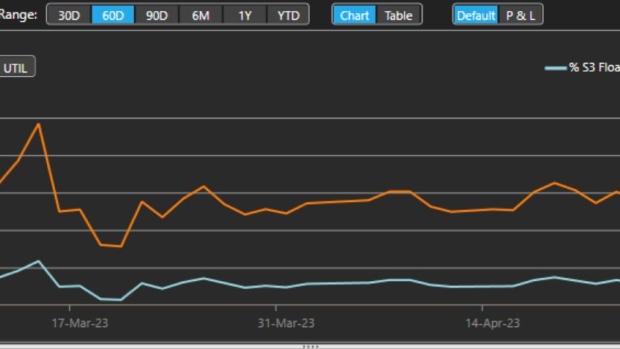May 2, 2023
Short Sellers Tightened Grip on Regional Banks in Runup to Rout
, Bloomberg News

(Bloomberg) -- Bearish bets on regional banks jumped appreciably in the last week and hedge fund shorts were part of the initial surge in selling as the group’s shares dropped Tuesday morning.
Short interest as a percentage of shares outstanding in the SPDR S&P Regional Banking ETF (ticker KRE) rose to 96% from 74% a week ago, according to data compiled by S3 Partners. When accounting for the synthetic long bets created in each short sale, it means almost 50% of positions in the ETF are wagering on a decline. That number climbed from 42% last Tuesday.
While high short interest in banks is hardly a shock after a string of high-profile failures, it may be adding to pressure in the shares. Bearish hedge-fund traders were present in the bout of selling that erupted this morning and later prompted long-only investors to sell too, according to a note from John Flood, a partner at Goldman Sachs Group Inc.
First Republic Bank’s collapse into an 11th—hour acquisition by JPMorgan Chase & Co. triggered another round of volatility Tuesday. KRE, which counts New York Community Bancorp Inc., M&T Bank Corp. and Regions Financial Corp. among its biggest constituents, fell for a second day to its lowest since October 2020. It has lost 9% so far this week.
“The fact that we didn’t get a sigh-of-relief rally in the regionals yesterday likely further emboldened the folks that short that group for a living,” Art Hogan, chief market strategist at B. Riley Wealth Management, said in an interview. “By that I mean, ‘Wait a minute, this group never got a bid when we put the last problem child to bed, and maybe we can continue to press these shorts.’”
On Tuesday, a number of regional banks took hits, with PacWest Bancorp dropping 25% and Western Alliance Bancorp falling that much before recovering some. Not a single member of KRE was trading higher on the day, according to Bloomberg data compiled shortly at 3:30 p.m. in New York.
“It’s unclear right now whether these banks actually have substantive weaknesses,” said Ellen Hazen, chief market strategist and portfolio manager at F.L. Putnam Investment Management. “Or whether or not it is just raiders trying to get the stocks to go down — whether or not it’s short sellers or others trying to force the Fed’s hand.”
The rout in the banking sector deepened investor anxieties about the Federal Reserve’s upcoming policy decision. Financial-sector turmoil may itself constrain economic activity as banks become less willing to lend. Stocks are priced for an optimistic Fed outcome, said Morgan Stanley’s Mike Wilson in a note this week. “If the message delivered at this meeting is more hawkish, it could provide a near-term negative surprise for equities,” he said.
In mid-April, before First Republic’s rescue, Warren Buffett said more US banks were likely to fail, while JPMorgan’s Jamie Dimon this week said we were getting near the end of the bank failures. That probably made investors “sit up and take notice,” said Sam Stovall, chief investment strategist at CFRA.
Stovall has been tracking market breadth, which has been deteriorating as just a handful of stocks have been contributing to the majority of gains over the past few weeks. In addition, he expects the Fed to raise rates in June as well as this week, something most market participants aren’t expecting.
“Investors are saying, ‘Yyou know what? We could find more of these regional banks that are having problems because of the Fed’s need to maintain its aggressive tightening policy,’” he said in an interview.
--With assistance from Sam Potter, Emily Graffeo and Lu Wang.
©2023 Bloomberg L.P.






